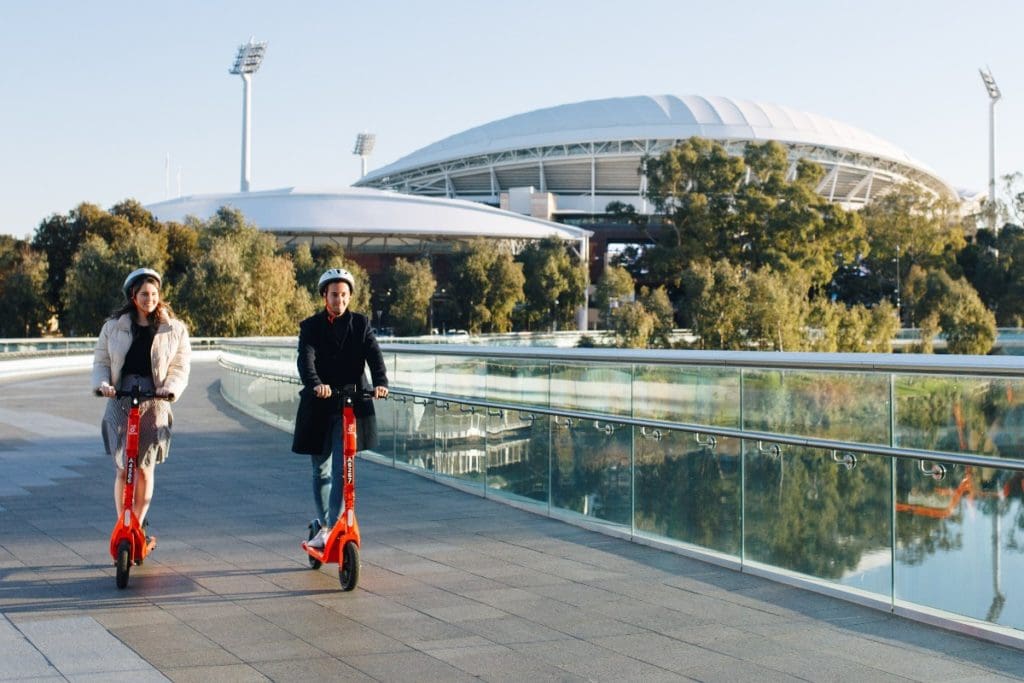Further Expansion for Adelaide e-Scooter Trials

Adelaide, SA
E-scooter share schemes in the heart of Adelaide are poised for further expansion, with the City of Adelaide council resolving to extend a pilot in North Adelaide for another 12 months.
A meeting of the council last month voted to apply to the South Australian Minister for Transport and Infrastructure for an extension of the North Adelaide trial beyond its current deadline of 31 October.
The trial builds upon existing e-scooter share services in the city’s CBD, which have been operating since 2019.
Last month’s meeting also voted for a small expansion of the CBD e-scooter share zone, to provide a link to another e-scooter share service in a neighbouring local government area, the City of Norwood, Payneham & St Peters.
E-scooter share services were first trialled in the Adelaide CBD in February 2019, coinciding with the Adelaide Fringe Festival.
In April 2019, the City of Adelaide granted urban mobility companies Beam and Ride permits to operate e-scooters across the CBD for a six-month period, before extending it for another three months.
Those services are ongoing, albeit with a period of shutdown in 2020 because of COVID and with a change in players after Neuron purchased Ride.
A report to the September council meeting branded e-scooter services in the City of Adelaide a success since their introduction in February 2019, with more than 460,000 e-scooter trips undertaken during the first six months of 2021, covering over 630,000 kilometres and averaging more than 2,500 trips per day.
Push to Include e-Scooters in Road Rules
September’s meeting also voted to support the inclusion of e-scooters in the Australian Road Rules. The report says a National Transport Commission (NTC) review of the Australian Road Rules in 2019 identified regulatory barriers preventing safe and legal use of personal mobility devices such as e-scooters.
It led the NTC to recently amend the Australian Road Rules to include e-scooters and other personal mobility devices.
“These national rules are a model law and have no legal effect. They will need to be adopted into the road rules of each State and territory to have legal effect, with each State having the ability to apply specific regulations on use,” the City of Adelaide report says.
“Should South Australia incorporate e-scooters into the road rules, Ministerial approval will no longer be required for the operation of e-scooters. A permit will still be required for shared mobility e-scooters to be offered for hire in the city, but shared mobility and private devices will be able to be ridden in the city.”
The report says City of Adelaide received 395 items of feedback regarding e-scooters since the first trial in February 2019 but 45% of that feedback was submitted during the first six months. Much of the feedback related to rider behaviour.
In contrast, 66 items of feedback were received in the first half of 2021 and 55 related to improperly placed e-scooters. Just two related to poor rider behaviour.
“Overall, the trial is considered to be successful, with high levels of use and decreasing complaints and incidents regarding e-scooters,” the report states.
The meeting was told there is a growing number of people using the shared e-scooters to travel between local government areas.
In May, the City of Norwood Payneham & St Peters became the fifth council in Adelaide to trial e-scooters, also partnering with Beam and Neuron.
According to the City of Adelaide council report, another inner-city local government, the City of Unley, is also planning to begin a trial by the end of 2021, subject to Ministerial approval.
